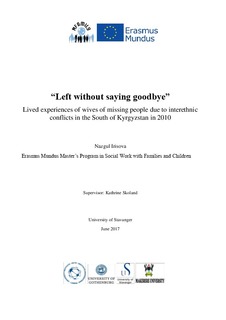| dc.description.abstract | There are a lot of cases when people disappear against their will, while other might decide to disappear intentionally, in order to protect themselves from violence. The reason of disappearance could be wars, conflicts or any naturals disasters. The families, friends who stay behind not always have an opportunity to say goodbye to those who went missing. One of the examples is interethnic conflict in the South of Kyrgyzstan, when there were people who went missing unintentionally. The families who left behind do not know any information about their loved ones either what happened to them or whether they are alive or not. This confusion about the fate of the loved ones leads to issues with identity, roles and responsibilities in the families. Moreover, for all the families it could be a very stressful situation which forces the wives to learn to cope with their ambiguity. Unfortunately, there are only few researches have been conducted in the Asian context and majority of the works are done in the western countries.
The purpose of this study was to explore the lived experiences of wives of missing people in the “peace-building” apartment buildings. The main objectives of the research was to identify the coping mechanisms of wives with their ambiguous loss and self-perception of wives about their status as “widows” or “wives of missing people”. Moreover, to contribute to the studies about the ambiguous loss.
The research was based on 5 semi-structured interviews with wives of missing people due to interethnic conflicts in the South of Kyrgyzstan in 2010, 1 focus group interview the same group and 3 additional interviews with representatives of passport agency, psychologist and clergy. The key informants were added after the focus group discussion, in order to get more information on what the wives of missing people mentioned. The findings were analyzed by using Thematic analysis.
The findings show that when the husbands went missing, the wives gained new responsibilities and seen as both “mothers and fathers” and became breadwinners of the families. Moreover, the religion and state contradict each other in recognizing a wife of a missing person. For example, it was found that religion perceives the wives of missing people as the wives who have to wait for 30 years as “waiting wives”, while the state recognizes them only as “widows”. In respect to coping mechanisms, the wives use social support as the coping mechanisms, which was very common. In addition, there were 2 more coping mechanisms that were recognized as avoidance and praying. | nb_NO |
